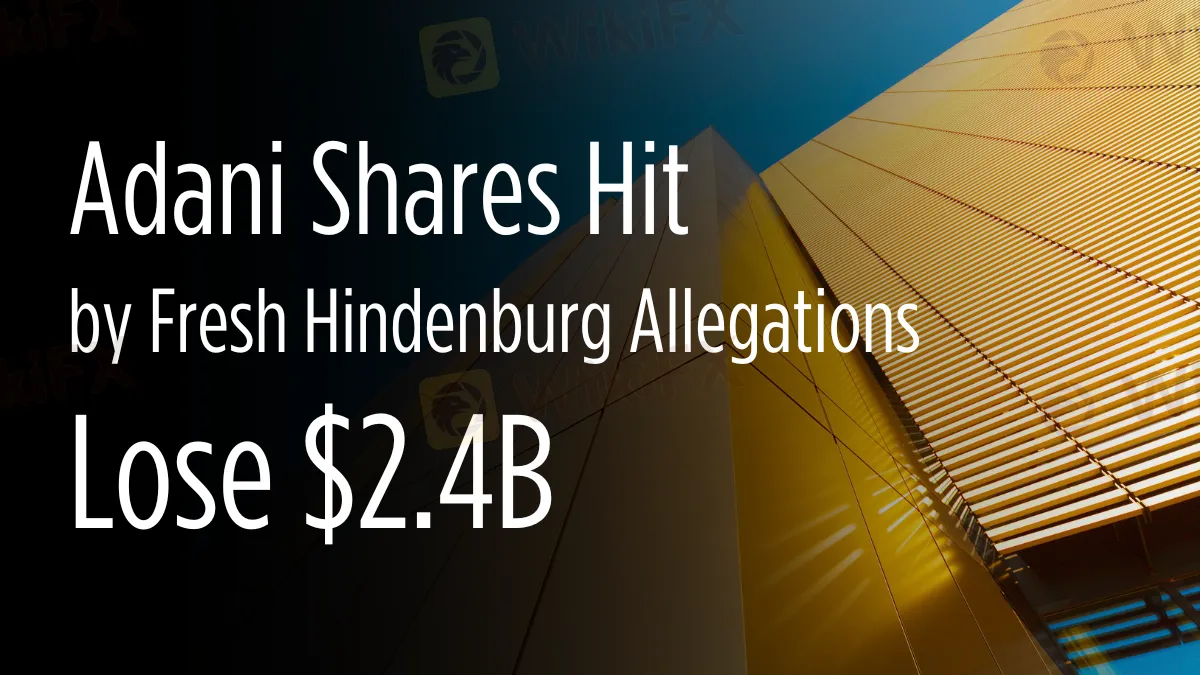简体中文
繁體中文
English
Pусский
日本語
ภาษาไทย
Tiếng Việt
Bahasa Indonesia
Español
हिन्दी
Filippiiniläinen
Français
Deutsch
Português
Türkçe
한국어
العربية
Adani Shares Hit by Fresh Hindenburg Allegations, Lose $2.4B
Abstract:Adani Group faces new allegations by Hindenburg, leading to a $2.4 billion loss in market value. Accusations focus on SEBI's head and offshore funds.

The Adani Group, a prominent Indian conglomerate, has come under renewed investigation as a result of fresh charges made by US-based short seller Hindenburg Research. The company's shares took a massive hit on Monday, losing $2.4 billion in market value at the end of the day. This is the latest phase in the Adani Group's protracted struggle with Hindenburg, which started roughly 18 months ago.
The fresh selloff was spurred by Hindenburg's newest report, which says that Madhabi Puri Buch, the chairman of the Securities and Exchange Board of India (SEBI), has links to Adani Group-linked offshore funds. According to the article, the conglomerate utilized this cash to dodge taxes, an assertion that the Adani Group has categorically refuted. The firm asserts that its offshore holding structure is transparent and in accordance with all legal requirements.
SEBI and its chairwoman, Buch, denied the charges as unjustified. SEBI released a second statement stating that the allegations made by Hindenburg against the Adani Group had been properly probed. Buch criticized the claims as an effort at “character assassination” in light of the regulator's earlier enforcement proceedings against the short seller.
Despite these denials, the effect on Adani's stock was swift. Adani Enterprises, the group's main company, saw its stock price decline by 1.1% on Monday. Other significant firms in the group, such as Adani Ports, Adani Total Gas, Adani Power, Adani Wilmar, and Adani Energy Solutions, had losses ranging from 0.6% to 4.2%. Adani Green was the exception, finishing 1% higher.

Market analysts like Sunny Agrawal, head of fundamental equity research at SBICAPS Securities, believe the market's reaction to these new charges is likely a brief knee-jerk reaction. Agrawal said that the Adani Group has faced similar claims, and substantial investigations have been conducted over the previous year and a half. He expressed optimism that the situation would eventually settle and share prices would return to normal.
Since Hindenburg's first analysis in January 2023, the Adani Group has encountered considerable hurdles in sustaining investor trust. The original revelation resulted in a dramatic decrease in the company's market value, with losses of almost $150 billion. However, significant investments from Abu Dhabi-based International Holding Company (IHC) and US boutique investment company GQG Partners have restored some trust, reducing the group's share value losses to about $32.5 billion.
In the middle of this turmoil, the Adani Group is proceeding with its commercial objectives. Adani Enterprises is planning a $1 billion equity offering by mid-September to raise funds after withdrawing a record $2.5 billion offer in the aftermath of Hindenburg's original claims. Adani Energy has recently raised $1 billion in finance from US investors and sovereign wealth funds.
Kranthi Bathini, Director of Equity Strategy at WealthMills Securities, said that the recent charges against SEBI might put pressure on Adani stocks in the short to medium term. He argued that the ambiguity surrounding these allegations may have a significant impact on retail investors.
The political aspect of the problem is also gaining ground. Ravi Shankar Prasad, a Bharatiya Janata Party legislator, slammed Hindenburg's report, calling it a bogus allegation intended to divert attention away from SEBI's current enforcement action. Prasad stressed that both SEBI and Buch's family have reacted to the claims, leaving nothing further to say.
Meanwhile, opposition leader Rahul Gandhi raised alarm over the claims. In a post on X, he cautioned that the charges against its head had jeopardized the credibility of SEBI, the regulator in charge of preserving the money of small retail investors.

As the Adani Group continues to face these obstacles, the long-term implications of Hindenburg's newest analysis remain unknown. However, the conglomerate's resiliency and continuous backing from important investors indicate that it is determined to weather the storm.
FAQs
1: What triggered the recent $2.4 billion loss in Adani Group's market value?
Answer: The recent $2.4 billion loss in Adani Group's market value was triggered by new allegations from U.S.-based short seller Hindenburg Research. The report claimed that Madhabi Puri Buch, chairperson of the Securities and Exchange Board of India (SEBI), has links to offshore funds associated with the Adani Group, which were allegedly used to avoid taxes. Despite the Adani Group's denial of these claims, the market reaction led to a significant selloff in the company's shares.
2: How did SEBI and Adani Group respond to Hindenburg's latest allegations?
Answer: SEBI and its chairperson, Madhabi Puri Buch, have strongly denied the allegations made by Hindenburg Research. SEBI stated that the claims were thoroughly investigated and found to be baseless. Buch characterized the allegations as an attempt at “character assassination” and dismissed them as unjustified, particularly in light of SEBI's earlier enforcement actions against the short seller.
4: What impact might the ongoing allegations have on Adani Group's future business plans?
Answer: The ongoing allegations could create short to medium-term pressure on Adani Group's stock prices and investor sentiment, potentially complicating its future business plans. However, despite these challenges, the Adani Group is moving forward with significant initiatives, including a $1 billion equity offering by mid-September. Despite the controversy, The group has secured $1 billion in funding from U.S. investors and sovereign wealth funds, indicating continued confidence from key investors.
Explore the latest developments impacting global markets. Visit the WikiFX news page for in-depth coverage and insights on Adani Group's ongoing challenges and more.

Disclaimer:
The views in this article only represent the author's personal views, and do not constitute investment advice on this platform. This platform does not guarantee the accuracy, completeness and timeliness of the information in the article, and will not be liable for any loss caused by the use of or reliance on the information in the article.
Read more

Never Heard of Dynasty Trade? Here's Why You Should Be Worried
Have you heard this name before? No , it’s time you do because staying unaware could cost you. This platform is currently active in the forex trading and has been linked to several suspicious activities. Even if you’ve never dealt with it directly, there’s a chance it could reach out to you through ads, calls, messages, or social media. That’s why it’s important to know the red flags in advance.

WEEKLY SCAM BROKERS LIST IS OUT! Check it now
If you missed this week's fraud brokers list and are finding it difficult to track them one by one — don’t worry! We’ve brought together all the scam brokers you need to avoid, all in one place. Check this list now to stay alert and protect yourself from fraudulent brokers.

Catch the Latest Update on BotBro & Lavish Chaudhary
BotBro, an AI-based trading platform, became popular in India in 2024—but for negative reasons. Its founder, Lavish Chaudhary, who gained a huge following by promoting it heavily on social media. Since then, he has become well-known, but for many controversies. Let’s know the latest update about Botbro & Lavish Chaudhary.

Trading Other People’s Money | What Prop Firms Don’t Tell You
Proprietary (prop) trading firms have become increasingly popular. They give traders the chance to trade with larger amounts of money without risking their own savings. For many, this sounds like the perfect opportunity to grow faster and earn more. But while the benefits are appealing, there are also risks and hidden rules that traders must understand before joining a prop firm.
WikiFX Broker
Latest News
RM750 Million Lost to Investment Scams in Just Six Months
5 things to know before the Thursday open: Meme stock revival, Trump's Fed visit, Uber's gender feature
Why Octa Is the Ideal Broker for MetaTrader 4 & 5 Users
CNBC's Inside India newsletter: Leaving, but not letting go — India's wealthy move abroad, but stay invested
Moncler raises prices on tariffs, may postpone store openings if downturn worsens
Titan FX Adds WhatsApp and Telegram for Enhanced Support
Nestle flags further potential price hikes as tariffs, commodities weigh on margins
Stop Level Forex: How Does it Help Traders Prevail When Losses Mount?
eToro Launches Spot-Quoted Futures Trading in Spain
Titan FX Introduces Redesigned Client Cabinet for Enhanced Usability
Currency Calculator


